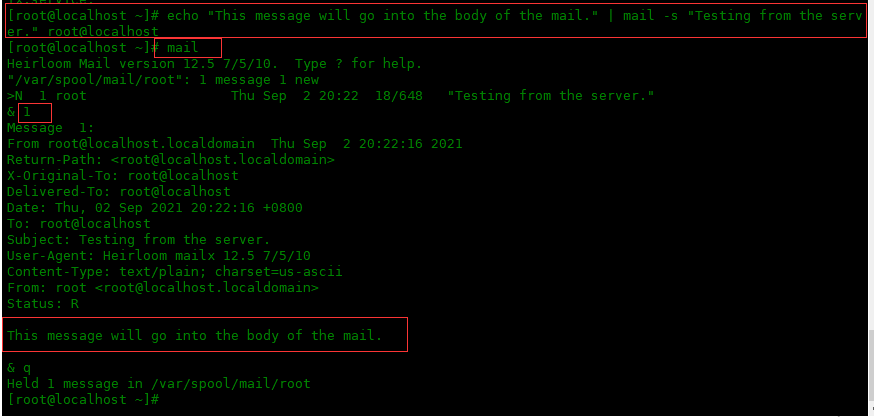Linux - Shell script for automatically monitoring disk usage
如果您在服务器上运行关键任务,那么监控磁盘使用情况并在达到阈值时通知管理员是非常重要的。本文将介绍如何编写一个脚本来自动监控磁盘使用情况,并在达到阈值时将报告发送到您的邮箱。
在本文中,我们将编写一个 shell 脚本,在 crontab 中指定固定时间间隔监控磁盘使用情况,并在报告达到指定阈值时通过电子邮件发送报告。
首先,需要确保系统安装了 mail 命令和 postfix 发送邮件服务。下面是在 Centos8 中安装这些工具的命令:
[root@localhost ~]# yum -y install mailx postfix [root@localhost ~]# systemctl enable --now postfix
下面使用mail命令发送邮件测试:
[root@localhost ~]# echo "This message will go into the body of the mail." | mail -s "Testing from the server." root@localhos

本文不讲解如何配置smtp服务。
测试磁盘使用情况的脚本
以下是测试磁盘使用情况并将报告发送到指定邮箱的脚本。脚本的解释在代码片段之后给出。
[root@localhost ~]# vim disk-monitor.sh
#!/bin/bash
MAILID="admin@linuxprobe.com"
VALUE=80
SERVERNAME=$(hostname)
MAIL=/bin/mail
for line in $(df -hP | egrep '^/dev/' | awk '{ print $1 "_:_" $5 }')
do
FILESYSTEM=$(echo "$line" | awk -F"_:_" '{ print $1 }')
DISK_USAGE=$(echo "$line" | awk -F"_:_" '{ print $2 }' | cut -d'%' -f1 )
if [ $DISK_USAGE -ge $VALUE ];
then
EMAIL="$SERVERNAME - $(date): $FILESYSTEM Exceeded the threshold VALUE\n"
EMAIL="$EMAIL\n Usage Details\n Current Usage:($DISK_USAGE%) Threshold value: ($VALUE%)"
echo -e "$EMAIL" | $MAIL -s ""$SERVERNAME" Disk Usage Alert: Needs Attention!" "$MAILID"
elif [ $DISK_USAGE -lt $VALUE ];
then
EMAIL="$EMAIL\n$FILESYSTEM ($DISK_USAGE%) is lessthan the threshold ($VALUE%)"
EMAIL="$EMAIL\n"
echo -e "$EMAIL" | $MAIL -s ""$SERVERNAME" Disk Usage Alert: Threshold Not Reached" "$MAILID"
fi
done
监控脚本说明
上述脚本使用df -hP命令获取内存信息。
环境变量MAILID保存必须在其中发送报告的邮箱地址。
VALUE 保存要设置的阈值。
SERVERNAME 保存服务器的主机名,用于电子邮件通知中的服务器标识。
使用 for 循环,它将遍历所有具有“/dev”挂载点的文件系统。然后它将文件系统名称和磁盘使用百分比保存到两个变量FILESYSTEM 和 DISK_USAGE。
使用上述变量,磁盘使用量等于阈值 VALUE 变量。根据结果,将向指定的邮箱发送一封电子邮件。
监控脚本执行
下面需要修改一下disk-monitor.sh脚本的权限,为它添加可执行权限:
[root@localhost ~]# chmod +x disk-monitor.s
使用下面方式运行脚本:
[root@localhost ~]# ./disk-monitor.s
自动化监控过程
手动运行脚本没有任何意义,因为我们希望自动运行该过程。自动运行该过程的最佳方法是将脚本添加到 crontab配置文件中。
使用下面方式打开crontab:
[root@localhost ~]# crontab -
将下面内容添加到配置文件中:
*/5 * * * * sh /home/ec2-user/disk-monitor.sh

The above is the detailed content of Linux - Shell script for automatically monitoring disk usage. For more information, please follow other related articles on the PHP Chinese website!

Hot AI Tools

Undresser.AI Undress
AI-powered app for creating realistic nude photos

AI Clothes Remover
Online AI tool for removing clothes from photos.

Undress AI Tool
Undress images for free

Clothoff.io
AI clothes remover

Video Face Swap
Swap faces in any video effortlessly with our completely free AI face swap tool!

Hot Article

Hot Tools

Notepad++7.3.1
Easy-to-use and free code editor

SublimeText3 Chinese version
Chinese version, very easy to use

Zend Studio 13.0.1
Powerful PHP integrated development environment

Dreamweaver CS6
Visual web development tools

SublimeText3 Mac version
God-level code editing software (SublimeText3)

Hot Topics
 1654
1654
 14
14
 1413
1413
 52
52
 1306
1306
 25
25
 1252
1252
 29
29
 1225
1225
 24
24
 Linux Architecture: Unveiling the 5 Basic Components
Apr 20, 2025 am 12:04 AM
Linux Architecture: Unveiling the 5 Basic Components
Apr 20, 2025 am 12:04 AM
The five basic components of the Linux system are: 1. Kernel, 2. System library, 3. System utilities, 4. Graphical user interface, 5. Applications. The kernel manages hardware resources, the system library provides precompiled functions, system utilities are used for system management, the GUI provides visual interaction, and applications use these components to implement functions.
 vscode terminal usage tutorial
Apr 15, 2025 pm 10:09 PM
vscode terminal usage tutorial
Apr 15, 2025 pm 10:09 PM
vscode built-in terminal is a development tool that allows running commands and scripts within the editor to simplify the development process. How to use vscode terminal: Open the terminal with the shortcut key (Ctrl/Cmd). Enter a command or run the script. Use hotkeys (such as Ctrl L to clear the terminal). Change the working directory (such as the cd command). Advanced features include debug mode, automatic code snippet completion, and interactive command history.
 How to check the warehouse address of git
Apr 17, 2025 pm 01:54 PM
How to check the warehouse address of git
Apr 17, 2025 pm 01:54 PM
To view the Git repository address, perform the following steps: 1. Open the command line and navigate to the repository directory; 2. Run the "git remote -v" command; 3. View the repository name in the output and its corresponding address.
 Where to write code in vscode
Apr 15, 2025 pm 09:54 PM
Where to write code in vscode
Apr 15, 2025 pm 09:54 PM
Writing code in Visual Studio Code (VSCode) is simple and easy to use. Just install VSCode, create a project, select a language, create a file, write code, save and run it. The advantages of VSCode include cross-platform, free and open source, powerful features, rich extensions, and lightweight and fast.
 How to run java code in notepad
Apr 16, 2025 pm 07:39 PM
How to run java code in notepad
Apr 16, 2025 pm 07:39 PM
Although Notepad cannot run Java code directly, it can be achieved by using other tools: using the command line compiler (javac) to generate a bytecode file (filename.class). Use the Java interpreter (java) to interpret bytecode, execute the code, and output the result.
 What is the main purpose of Linux?
Apr 16, 2025 am 12:19 AM
What is the main purpose of Linux?
Apr 16, 2025 am 12:19 AM
The main uses of Linux include: 1. Server operating system, 2. Embedded system, 3. Desktop operating system, 4. Development and testing environment. Linux excels in these areas, providing stability, security and efficient development tools.
 vscode terminal command cannot be used
Apr 15, 2025 pm 10:03 PM
vscode terminal command cannot be used
Apr 15, 2025 pm 10:03 PM
Causes and solutions for the VS Code terminal commands not available: The necessary tools are not installed (Windows: WSL; macOS: Xcode command line tools) Path configuration is wrong (add executable files to PATH environment variables) Permission issues (run VS Code as administrator) Firewall or proxy restrictions (check settings, unrestrictions) Terminal settings are incorrect (enable use of external terminals) VS Code installation is corrupt (reinstall or update) Terminal configuration is incompatible (try different terminal types or commands) Specific environment variables are missing (set necessary environment variables)
 vscode Previous Next Shortcut Key
Apr 15, 2025 pm 10:51 PM
vscode Previous Next Shortcut Key
Apr 15, 2025 pm 10:51 PM
VS Code One-step/Next step shortcut key usage: One-step (backward): Windows/Linux: Ctrl ←; macOS: Cmd ←Next step (forward): Windows/Linux: Ctrl →; macOS: Cmd →




